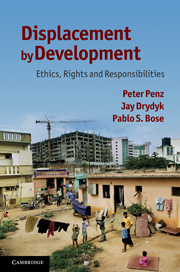PART I - FUNDAMENTALS
Published online by Cambridge University Press: 05 June 2012
Summary
When we probe the depth of the controversy over displacement by development, we find it penetrates so deeply that the two main camps even reject each other's conceptions of development. Facing polarization so deep and so strong, we propose to seek out a transformative moral middle ground, based upon widely held values, that will shed light on those policy positions that should be retained by each side, others that should be added, and finally those that should be abandoned. Since the present polarization reaches down to the conceptual level, an independent analysis of the concepts of development and displacement is especially important. In other words, our moral middle ground must begin with a conceptual middle ground.
The ‘managerialist’ approach focuses on harm reduction by recognizing the harms of displacement, by minimizing the number of people who are displaced, and by aiming to restore and improve the livelihoods of those who must be displaced. In this approach, the aims of development are not often scrutinized; including the oustees in development decision-making is not of primary importance, and the difficult questions of whether and when displacement must be consensual are deferred. These topics that are secondary to the ‘managerialists’ are primary to ‘movementists’. For them, the harm and suffering imposed upon the oustees brings into question the value of the development models that willingly displace them. The exclusion of oustees from decision-making stands out with equal prominence.
- Type
- Chapter
- Information
- Displacement by DevelopmentEthics, Rights and Responsibilities, pp. 15 - 16Publisher: Cambridge University PressPrint publication year: 2011

